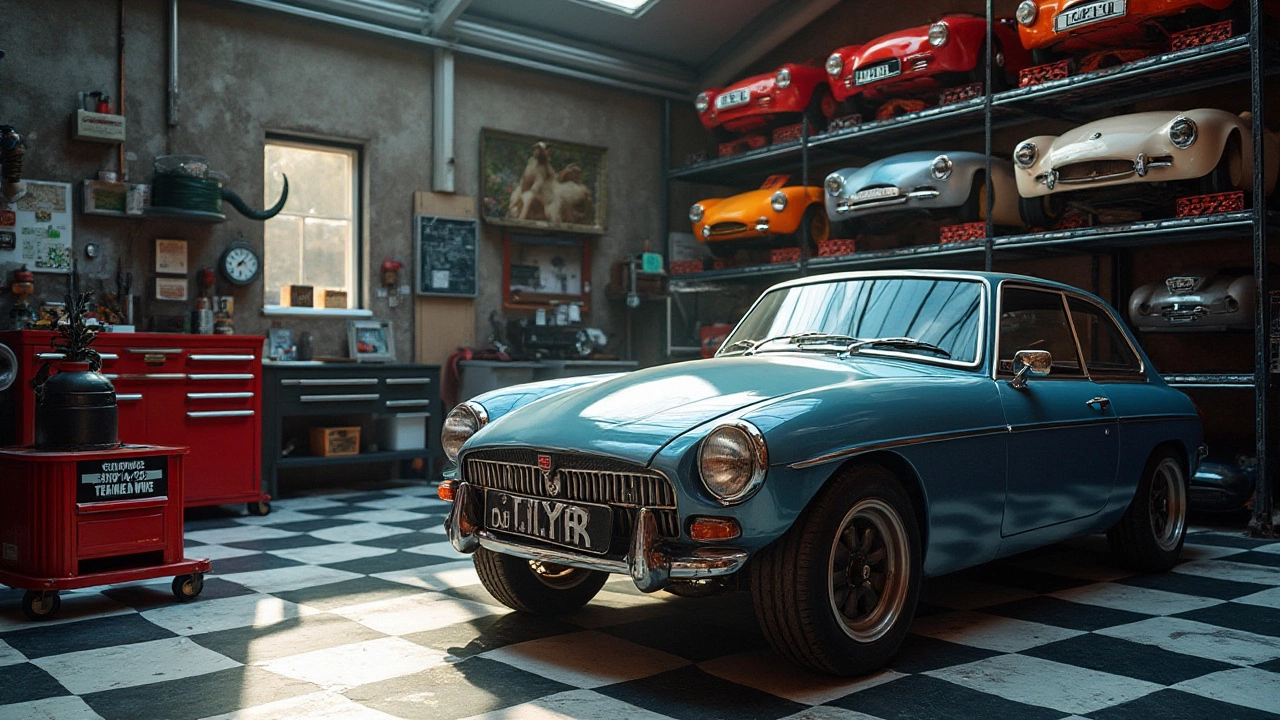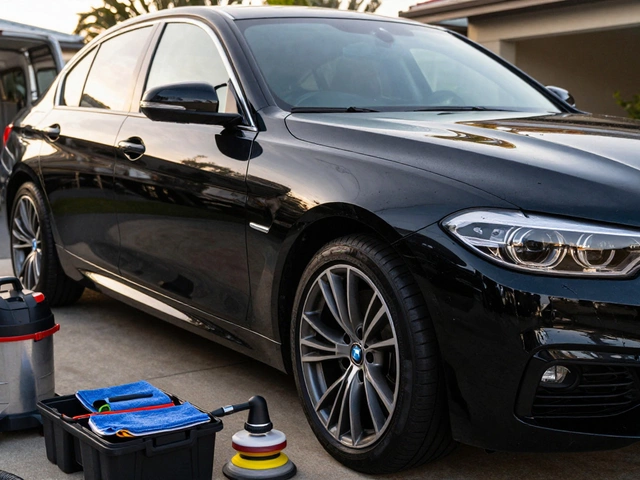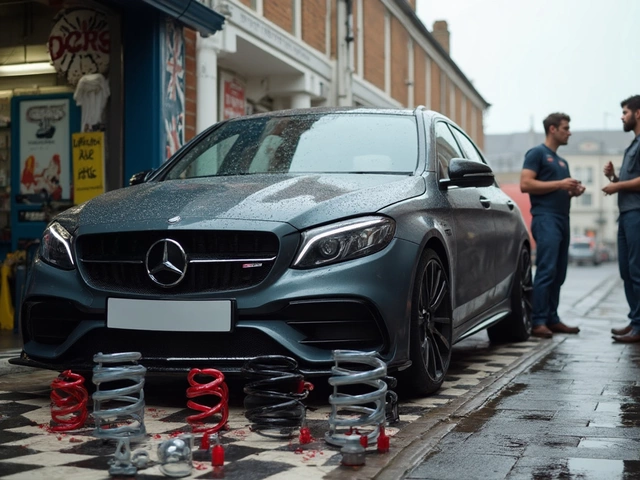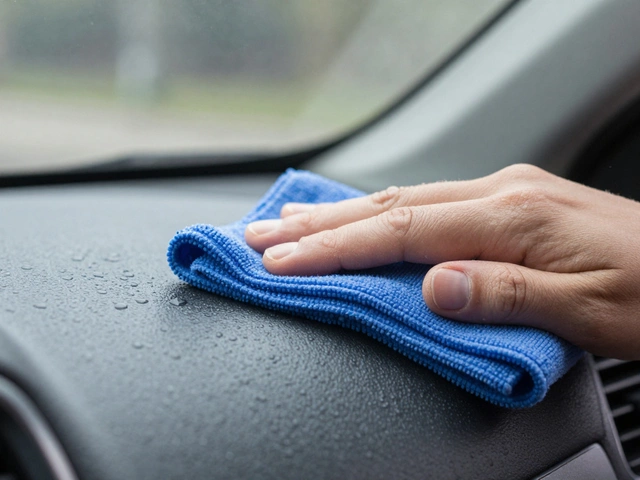For car enthusiasts, modifying vehicles can be a thrilling adventure. One popular alteration is the installation of a body kit, which can dramatically transform the look of a car. But what does this mean for the car's value when it's time to sell?
Body kits can be a double-edged sword in the automotive world. They appeal to some buyers looking for unique aesthetics but might deter others who prefer originality. Whether a body kit enhances or diminishes your car's value depends on various factors like current market trends and the quality of modifications.
Exploring these factors can make all the difference when you're weighing the pros and cons of fitting a body kit on your prized vehicle. Let's take a closer look at how body kits can affect your car's value.
- Understanding Body Kits
- The Impact on Aesthetics
- Market Trends and Resale Value
- Quality vs. Perception
- When Customization Pays Off
- Tips for Choosing the Right Body Kit
Understanding Body Kits
Body kits have been a staple in the realm of car customization, allowing vehicle owners to personalize their rides and make them stand out from the crowd. Essentially, a body kit is a collection of modifying components that are added to a car. These typically include front and rear bumpers, side skirts, spoilers, and sometimes roof scoops or fender flares. The primary goal of installing a body kit is to alter the car's appearance, but in some cases, they can also contribute to performance improvements, such as enhanced aerodynamics that allow the vehicle to slice through the air more efficiently.
The history of body kits dates back to the 1960s, when they first became popular among racing enthusiasts who wanted to reduce weight and improve the speed of their cars. Over the decades, the automotive aftermarket industry has seen a massive evolution in the design and materials used in body kits. Modern kits are often crafted from lightweight yet durable materials like fiberglass, polyurethane, or carbon fiber. These materials not only add to the visual appeal but can also enhance the vehicle's performance by reducing drag.
Customization has levels of appeal across different demographics. For some, the aesthetic transformation a body kit provides is utterly irresistible. It allows car owners to express their personal style, making each vehicle unique. Some high-quality kits are designed to be functional, improving handling and grip at high speeds. However, not all kits are created equal; the market's offerings range from professionally engineered masterpieces to low-quality replicas that might not fit perfectly, potentially leading to issues.
The renowned auto expert, Chris Esaki, once said, "The right body kit can transform a car from ordinary to extraordinary. It's more than just aesthetics; it becomes an identity."
For buyers in the car market, a body kit can signal a previous owner's interest in high performance and personalization. This can be a double-edged sword. While some enthusiasts might find a modified car with a body kit tempting, others in the market may see it as a departure from the vehicle’s factory specifications, potentially causing concern about the car’s history, especially if modifications weren't done professionally.
Price points for these modifications vary widely. A quality kit, including installation, can range from a few hundred to several thousand dollars. The price reflects not just the build material, but also the precision of design and ease of installation. Poorly fitted kits can lead to unforeseen expenses in fitting, painting, and replacement parts. Thus, it’s crucial for anyone considering a body kit to do their research into reputable brands and seek out reviews from those who have installed the kits on similar car models.
The Impact on Aesthetics
When it comes to adding a body kit to your vehicle, the first and often most noteworthy change is the transformation in aesthetics. The mere sight of a sleek kit can provoke strong reactions, ranging from admiration to disdain, depending on personal style. Achieving a balance between personal taste and market appeal can be tricky. However, a well-chosen kit can spotlight the car's lines, giving it a unique identity that stands out on the road.
Car enthusiasts often view body kits as art installations, serving as a canvas for their creative expression. They aren't just about adding bulk or flair; they can redefine the visual language of the vehicle. A wisely selected kit highlights the contours of the car, possibly turning a bland-looking vehicle into a spirited masterpiece. It can become a head-turner during meets or car shows, drawing admiration from those who appreciate automotive artistry.
On the flip side, the wrong kit can make a car look clumsy or overdone, sometimes drawing negative attention. Misalignments or a lack of harmony between the kit and the vehicle's existing design language can lead to a discordant appearance, depreciating its visual appeal. A mishmash of styles such as a rugged off-road kit on a petite city car might not translate to good aesthetics.
Another significant aspect to consider is the material quality of body kits, which can range from fiberglass to carbon fiber, with each material having its pros and cons. Carbon fiber, for instance, is lauded for its durability and weight efficiency, although the high cost can deter some. Notably, fiberglass kits are more affordable but require expert installation to ensure longevity and maintain aesthetic appeal.
Market trends and public perception play pivotal roles in aesthetic decisions. In a quote from the automotive magazine 'Car Enthusiast Journal,' a leading industry designer said,
"A great body kit doesn't fight the car's original design — it enhances it. It's all about accentuating features and complementing curves."This philosophy resonates deeply within the community, emphasizing the need for complementary aesthetics rather than stark overhauls.
Additionally, cultural and regional preferences can sway aesthetic impacts. In some regions, sleek, minimalistic designs are favored, while others might prefer flashy, aggressive styles. Recognizing these differences can inform car owners who might be considering this kind of customization. Ultimately, the aesthetic impact of a body kit depends on blending personal style with market sensibilities to achieve a harmonious and appealing outcome.

Market Trends and Resale Value
Understanding how body kits affect the resale value of your vehicle is crucial for any enthusiast looking to explore the world of automotive customization. As with most things related to cars, the impact of body kits on resale value can vary significantly based on current market trends and buyer perceptions. The aesthetic appeal that one person finds exhilarating might not translate into a higher price tag when selling; in fact, it might even deter potential offers.
One aspect influencing the value proposition of installing a body kit is the prevailing trend in the car enthusiast community. Sometimes, minimalistic and sleek designs are all the rage, pushing buyers to pay more for modifications that adhere to these standards. On the flip side, there are seasons when flashy and aggressive looks grab more attention, potentially swelling demand and driving up resale prices. This nuanced dance between trends and resale values can make it quite the challenge for car owners to time their modifications for peak market demand.
In an interesting perspective shared by an automotive analyst, it was noted that "the return on investment of car modifications like body kits often hinges more on the personal tastes and regional preferences of potential buyers than on the tangible market value itself." Measuring and predicting these trends requires scrutinizing car shows, forums, and social media platforms where the pulse of the car modification community beats the loudest.
Despite the unpredictable nature of trends, certain indicators can help forecast whether a body kit will be seen as an asset or a liability. Cars with customized components that maintain a harmonious design, complement the car's existing aesthetic, and are executed with fine craftsmanship are often viewed more favorably. In these instances, not only can a body kit maintain its value, but it can also potentially enhance the vehicle's desirability, leading to higher bids from interested buyers.
Beyond merely following trends, the quality of the body kit installation plays a pivotal role in determining resale value. Cars that have body kits installed professionally with meticulous attention to detail, using high-quality materials expected to withstand time, tend to fare better in the market. In contrast, poorly executed modifications, even if trendy, can quickly become a detractor. Some potential buyers still prefer the original manufacturer look, valuing authenticity over customization.
To navigate effectively through these market fluctuations, potential sellers must keep a keen eye on emerging styles and buyer sentiments. Researching current trends and potential buyer profiles can provide insight into whether investing in a body kit will pay off at the time of sale. In addition, seeking advice from knowledgeable car clubs or online communities can offer valuable foresight into how body kit modifications might trend in the near future.
Ultimately, the impact of body kits on resale value cannot be understated. It is a decision that requires careful thought and a keen eye for both present and future market dynamics. With the right approach, a body kit can be an investment that not only brings personal joy but also enhances the value of your car for the right buyer at the right time.
Quality vs. Perception
When it comes to car body kits, the intricate dance between quality and perception plays a pivotal role in affecting a vehicle's value. The phrase "you get what you pay for" holds true here as the spectrum of quality in body kits can vary exponentially. High-quality kits, often made from robust materials and crafted with precise engineering, can turn a mundane car into a head-turning masterpiece that commands respect and admiration. Conversely, a poorly made kit can do just the opposite. The craftsmanship of a body kit not only impacts its appearance but also influences its durability and how it integrates with the car's original design.
Quality body kits often come with a heftier price tag, reflecting the superior materials and design precision they boast. Fiberglass, carbon fiber, and polyurethane are commonly used, each offering different benefits. Carbon fiber, for instance, is revered for its lightweight property and strength, making it a preferred choice for high-performance cars. However, the allure of a well-crafted kit can be diminished if it alters the car’s functionality or compromises safety standards. Hence, many potential buyers view vehicles with aftermarket modifications through a scrutinizing lens, aligning quality with perceived value.
Perception is equally important as quality when it comes to car modifications. Car enthusiasts may adore a striking spoiler or bumper, seeing it as an expression of individuality and modern aesthetics. Nevertheless, traditional buyers might perceive it as a deviation from the car's originally intended design, potentially raising questions about compatibility with the rest of the vehicle. This divergence in views can impact the perceived value. Dealers and buyers often worry whether these modifications adhere to the manufacturer's standards, which can further complicate the resale process.
"Quality means doing it right when no one is looking," quipped Henry Ford, a sentiment that resonates deeply when discussing car modifications. Quality extends beyond the visible, encompassing safety and efficiency, which should be prioritized as much as aesthetics.
Interestingly, market trends can flip the script on these perceptions. During certain periods, bold modifications become an in-demand fashion, aligning personal expression with market expectations. In such climates, the quality of a body kit can enhance the car's value significantly. When modifications are trending, and the target buyer is savvy about cars, a well-installed, high-quality body kit can become an asset rather than a liability. Sellers may even fetch a premium for unique aesthetics if demand is high. Yet, crucially, one must always remain aware of their target audience and market trends, as these can significantly shift over time.
Ultimately, whether a body kit adds or subtracts from a car's value is wrapped up in the ongoing dialogue between quality and perception. Sellers need to be informed, and buyers must weigh their desires against practical considerations. In a world where aesthetics and practicality often collide, understanding this dynamic can make the difference between a successful sale and a passing glance. Quality may be tangible, but perception is everything in making a lasting impression.
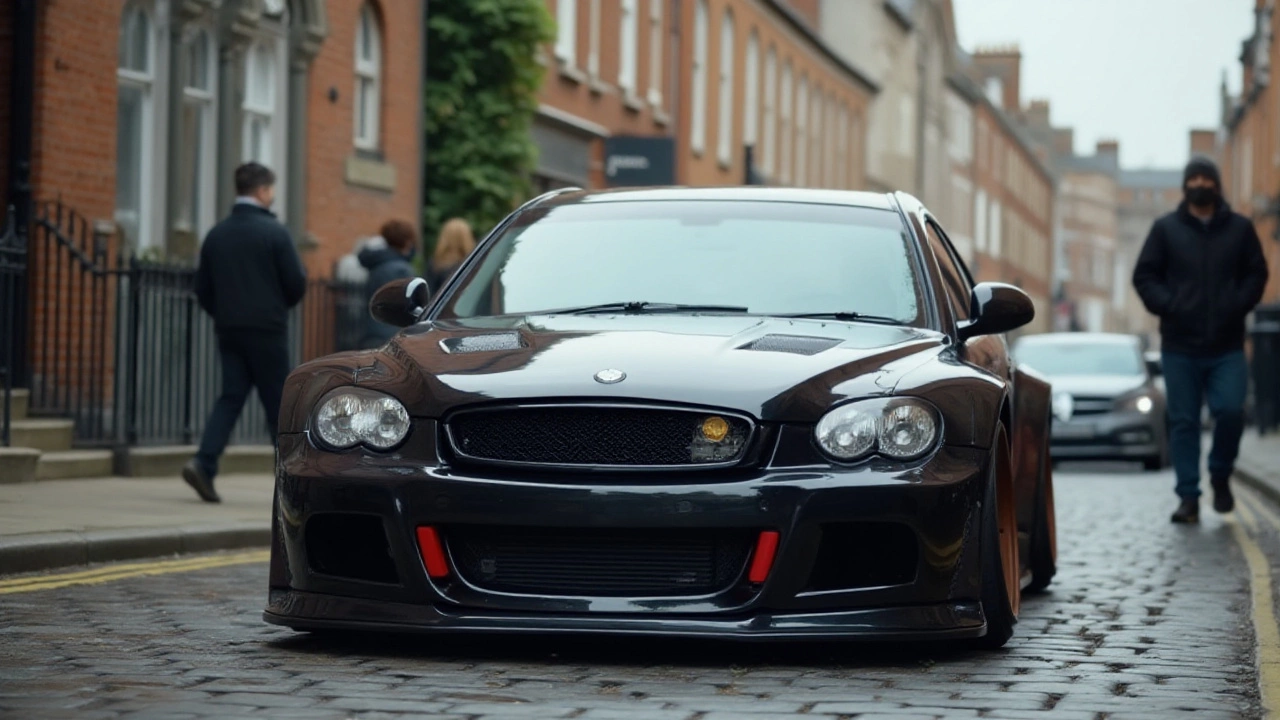
When Customization Pays Off
In the realm of car modifications, there comes a sweet spot where customization not only enhances the personal joy of the owner but may also increase the vehicle's worth to a potential buyer. This outcome largely depends on the factors like the quality of the modifications, the synergy between the vehicle's original design and the alterations, and the niche market preferences. Enthusiasts know that when executed correctly, modifications like a body kit can give a car a unique identity that attracts attention and admiration. However, whether or not these changes translate into monetary value when selling the car is another story.
Timing and trends play a critical role in the equation. For example, in 2023, there was a noted trend towards cars that embraced a retro aesthetic combined with modern performance upgrades. Vehicles that were thoughtfully customized to reflect this trend saw a spike in desirability and, consequently, value. This demonstrates that market demand can have a significant impact on whether a body kit or other modifications add value. A well-known car journal once noted,
"The value of customizations largely hinges on the narrative they weave with contemporary expectations and desires in the automotive sphere."The quote highlights the importance of aligning your car's modifications with current buyer sentiments.
Not all body kits are created equal. The craftsmanship, fit, and finish of these kits significantly determine their success. A high-quality body kit doesn't just change the look of the car; it maintains or even improves aerodynamic efficiency and adds an element of sophistication. Potential buyers often view these upgrades as indicators of the car's overall care and maintenance. If a potential buyer sees that the current owner invested in top-tier modifications, they're more likely to perceive the vehicle as being meticulously maintained.
Lastly, customization pays off when it’s tailored, not to every buyer, but to a specific segment who values individuality and flair. This is particularly true with car collectors or enthusiasts who seek uniqueness and authenticity. The finer details, such as color coordination, unique graphics, or rare aftermarket parts, can intrigue those who appreciate automotive art. They may find these aspects imperative and worthy of investing in. To sum up, when customization aligns well with high-quality execution and market demand, it can enhance both the aesthetic and financial appeal of a car. The right modifications can transform a standard vehicle into a coveted collectible, capturing the buyer's imagination and potentially commanding a higher price.
Tips for Choosing the Right Body Kit
Choosing the right body kit for your car can feel like a monumental decision. It's about more than just transforming your vehicle's aesthetics—it’s about preserving and potentially enhancing its value. The first and foremost thing to consider is the type of body kit that suits your car. There are several types such as full-body kits, lip kits, and wide-body kits, each serving different aesthetic and performance purposes. Take the time to research what each offers and match it with your personal style and what your car can accommodate.
Make sure to prioritize quality when selecting materials. High-quality materials like polyurethane, fiberglass, and carbon fiber are popular choices. They not only add durability but also give a sleek finish that can make your car stand out for the right reasons. Carbon fiber, while pricey, offers weight savings that can enhance performance, a factor that can appeal to performance enthusiasts. Fiberglass, on the other hand, is easier to mold but might be more prone to wear, so consider your driving habits when making this choice. According to an article in 'Car Tuning', performance enhancements should align with appearance upgrades
Understanding the compatibility of the body kit with your car model is crucial. Not all body kits are designed with universal compatibility in mind. Some kits are tailored specifically to fit certain models, which ensures a perfect fit and easier installation. A seamless installation can save you both time and potential headaches down the road. Moreover, a perfect fit ensures that the alterations do not negatively impact vehicle aerodynamics or safety features.
Another vital consideration is the reputation of the manufacturer or brand. Reputable brands invest heavily in research and development, ensuring that their kits not only look great but also meet rigorous safety and quality standards. Look for reviews and feedback from other car owners to gauge the performance and durability of the kits you are interested in. A good manufacturer will also offer a warranty, giving you peace of mind that the product has undergone quality checks and assurances.
Don't forget to plan for the installation process. Some body kit installations can be quite intricate, requiring a professional hand to ensure they are fitted exactly as intended. While DIY installation might be tempting to save some bucks, a professional can ensure that the job is done to the highest standards, which can save you from potential damages or mishaps in the future.
Finally, it’s prudent to consider the long-term implications of adding a body kit. Think about whether the modification will appeal to a niche audience or if it has a wider selling appeal. A classic, timeless design might hold its value better than more experimental modifications. Also, determine if it aligns with emerging trends, ensuring your car remains a desirable asset in the future market.

